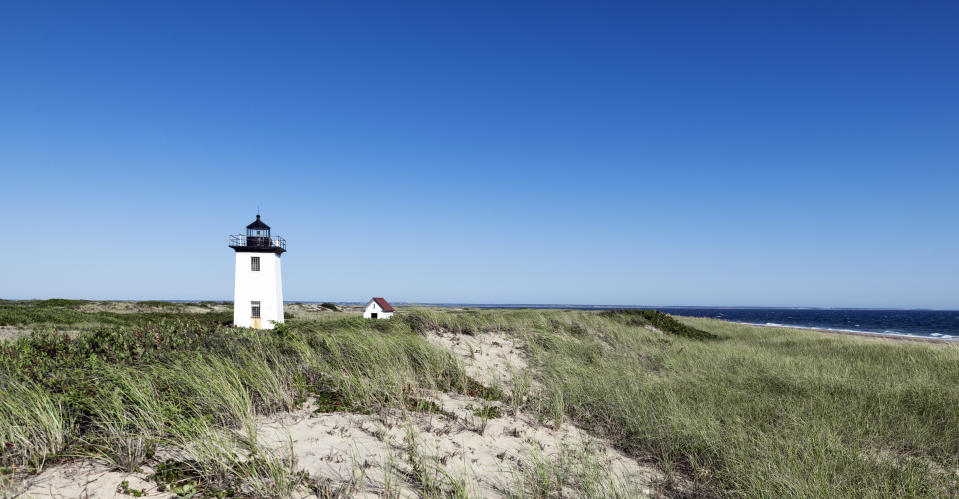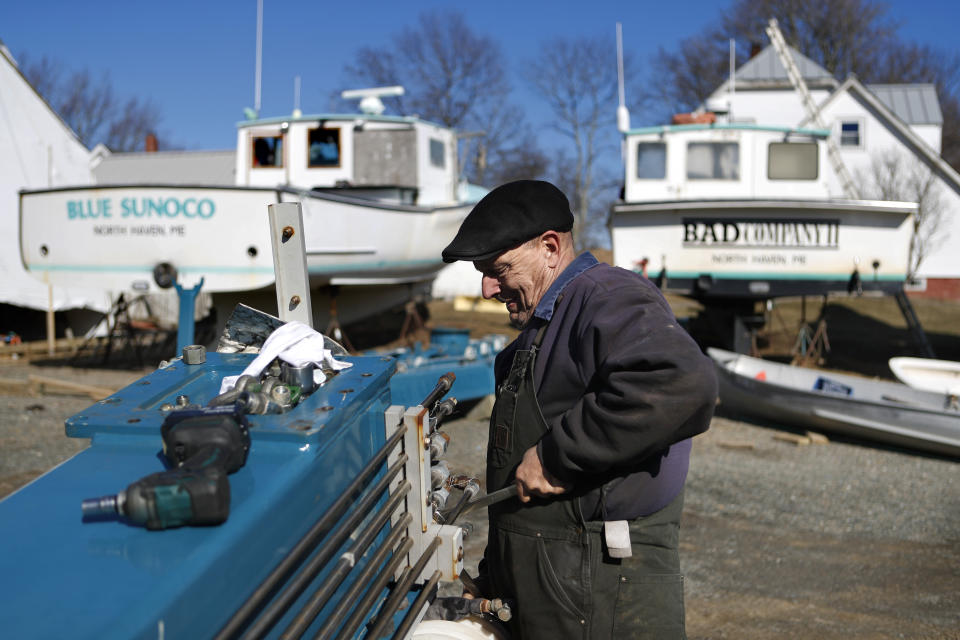Coronavirus sends city dwellers fleeing to second homes, inflaming tensions in towns across the nation

Amid increasingly vitriolic Facebook posts on various community pages about how city dwellers with second homes should stay away during the coronavirus pandemic, a nurse added her post to the mix, aiming to explain why she and her husband would be coming to the Cape Cod region in Massachusetts from New York in April.
“My husband and I are both RN’s… We are …coming to help with the influx of potentially critical patients into the Cape’s healthcare system,” she wrote. “Please keep in mind that not all your neighbors with NY or out of state license plates are there as a burden. Some may be there to help save your life if it’s needed. Let’s be kind in this time of need and help our neighbors not alienate them.”
Even among the dozens of positive comments, including, “You shouldn’t have to explain yourself,” were a couple of snarky responses disparaging their arrival, which have since been deleted. And an influx of similar posts have touched off debates that have sometimes continued for days — “I know many second homeowners who are far from rich,” noted a resident of Provincetown, at the most remote tip of Cape Cod and currently under a local state of emergency, in an attempt to diffuse resentment. Another added, “Today a woman asked me if a was a ‘townie’? And I was honestly nervous as to how to respond.”
Meanwhile, said one of many dissenters, “Not only should people not be flooding into town, people who live in [Provincetown] and have a place to leave to should leave to help the situation...why anyone thinks isolating on the tip of an island with limited resources is the thing to do is beyond me.”
Enter the latest version of “Us and Them,” coronavirus edition, with anxiety over the pandemic stoking age-old tensions between locals and second-homeowners in towns across the country and the world.

In New Jersey, Gov. Phil Murphy publicly urged folks with beach homes on the Jersey Shore to stay away from them. “The local infrastructure, especially the health care infrastructure, and especially in off-season, is not prepared for the influx of part-time residents,” he announced over the weekend. “There’s absolutely no excuse for a party at the beach. Please stay at your primary residences." Local Jersey Shore officials, including the Point Pleasant police chief and a Cape May County Freeholder expressed similar sentiments.
Related Video: Cities Struggle With Social Distancing
Meanwhile, the Maine island of North Haven voted to immediately ban visitors and seasonal residents to help stop the spread of COVID-19, the Outer Banks of North Carolina have closed to non-residents, the mayor of the tiny Village of Ruidoso in New Mexico issued an executive order asking visitors and second homeowners to stay away and Gov. Charlie Baker of Massachusetts has urged second homeowners to nix plans to hunker down on the islands of Nantucket and Martha’s Vineyard.
“We would prefer they not do that and that they stay on the mainland and don’t create additional issues for both of those Islands at a point in time when they don’t have the level of service capacity in place they typically would have in the summer,” he told reporters.

Now reports of similar pleas from officials in bucolic getaways from Cornwall, England to the remote Highlands of Scotland have also emerged.
But what about the belief that, as one Facebook community page user stressed, “It’s not a privilege to go to a home you own — in fact it seems a privilege to feel you’re positioned to prevent a homeowner’s right to reside in their own home.”
It’s all launched a deeply uncomfortable discussion about privilege and property taxes and insiders and outsiders, with op-eds parsing the details. One in the Asbury Park Press noted, “What I sensed from these heated Facebook discussions is that people who live at the Jersey Shore are fearful and looking to barricade themselves in. They are also looking for a scapegoat.”
Even experts in ethics disagree on the matter.
"Just because we have a right to do something doesn't mean it's right to do it," Bruce Weinstein, known as the Ethics Guy, tells Yahoo Lifestyle. "As of March 24, over a dozen states have asked residents to stay at home… Even if we're not legally required to stay put, there are good reasons to do so." He adds, "As the Washington Post has reported, the first confirmed case of coronavirus in Vermont was from a man who left his home in New York to go to his vacation home there. The Post also quoted a Nantucket hospital that cannot handle a mass evacuation from New York."
Weinstein concludes, "If ever there were a time to stop thinking solely about ourselves and include the well-being of others into our decision making, that time is now. The ethically intelligent thing to do is for all of us to stay put and avoid overtaxing systems like the health care facilities in small vacation towns."
However Margaret P. Battin — a professor of philosophy at the University of Utah’s Medical Ethics program and editor of the 2006 academic publication Ethics Infectious Disease — is not so sure.
“The underlying wariness of outsiders — who typically have more money and more mobility than the local folk, whether farmers or fishermen — can become underlying resentment,” she tells Yahoo Lifestyle. Adding coronavirus fears on top of that — “you might come buy our supplies and infect us with this disease that only you have” — can create a toxic brew.
Battin suggests trying to think logically through each point of worry. “The assumption is it’s these outsiders who would bring disease,” she says. “But I don’t know, in contact tracing, if that’s how transmission actually works.”
As for the frequently-held belief that second homeowners are “taxing the system,” she says, “It’s true that if you got ill, you might tax whatever medical facilities there are — and of course you’ll pay for them through your insurance. On the other hand, these second-home folks are often the ones who have contributed the most to local economies; they bring quite a lot of affluence into the community and into the community’s tax base.”
Battin noted that the way we’re all encouraged to think about transmission is that everyone is responsible for protecting themselves. “So, you’re supposed to wash your hands, stay six feet away from others, not congregate. The onus is on you to do two things: not spread it and not receive it. If people come to your remote county, they’re not more likely to spread the virus than any other people, and they are expected to be as restrained as the local folk are.”
So, the question, then, shouldn’t necessarily be, “Is it wrong to go there?” but rather, “Are there things you shouldn’t do when you go there and are they different than things you shouldn’t do when you’re in the city?”
“It seems to me that saying it’s wrong to go there is making at least two assumptions: one, that your economic impact there would be negative, and second, that you would be likely to spread the virus while you’re there,” Battin says. But those are assumptions that, as she points out, aren’t necessarily true.
Finally, Battin stresses something similar to what was announced on Facebook by Provincetown’s Select Board member Lise King, and picked up in the New York Times: “TO ANYONE THINKING ABOUT COMING TO PTOWN: PLEASE make yourself aware of our circumstances and make an informed choice. If you come here and fall ill you are taking a risk that we won’t have the capacity to help you,” she said.
“The person who goes to remote places has to remember they are increasing risks to themselves, in a way,” Battin says, noting that, while she has a cabin in a remote rural area of Utah, she’s decided to stay put in Salt Lake City, where she’s “7 minutes away from a top-flight hospital… So it’s not as though I’m only imposing risks on them, but assuming them myself, as well. We don’t always think about the other side of the argument.”
For the latest news on the evolving coronavirus outbreak, follow along here. According to experts, people over 60 and those who are immunocompromised continue to be the most at risk. If you have questions, please reference the CDC and WHO’s resource guides.
Read more from Yahoo Lifestyle
Want daily pop culture news delivered to your inbox? Sign up here for Yahoo Entertainment & Lifestyle's newsletter.



